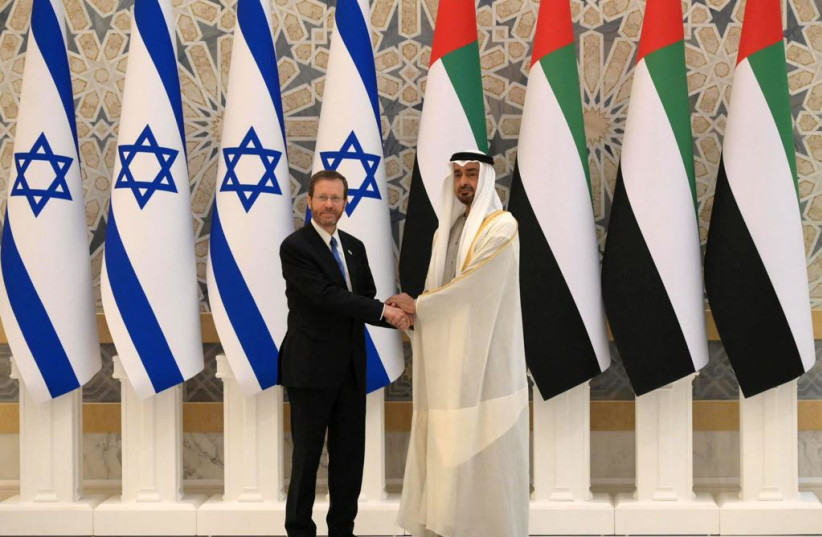Israeli President Isaac Herzog landed in Abu Dhabi on Sunday to express his condolences to the new United Arab Emirates president, Sheikh Mohammed bin Zayed, on the death of his brother, the late president Sheikh Khalifa bin Zayed.
This was important, and Herzog was one of many dignitaries who went to the UAE to express their condolences over the death of Sheikh Khalifa bin Zayed.
“The president was joined on his flight by representatives of the government of Israel, Regional Cooperation Minister Esawi Frej and Communications Minister Yoaz Hendel,” Herzog’s office said.
The symbolism is important. The Abraham Accords took place in 2020, and since then, Israel and the UAE have had positive relations. This builds on previous shared interests. It is also part of the broader shift in which Israel made peace with Bahrain, has new ties with Morocco and is working with Egypt and Jordan.
On Monday, the new UAE president received foreign leaders for a second day, UAE-based The National newspaper reported.

“Leaders from around the world continued to arrive in Abu Dhabi to pay their respects on Sunday following the death of Sheikh Khalifa and the election of the president, Sheikh Mohammed,” the report said.
Israel was mentioned and highlighted in the reports, along with the UK, India and France. Indeed, these are the key friends of the UAE these days. The UAE and India have close relations, as do India and Israel. The UAE is buying warplanes from France, and France sees its relations with the UAE as anchoring its historic influence in the region. The UK has historic and important ties to the Gulf.
The importance of Mohammed bin Zayed in UAE foreign policy and defense affairs has been clear. Over the past two decades, since he was appointed deputy crown prince and then crown prince, he has been important for the UAE as it manages its affairs in the shifting Middle East.
These shifts are clear because the US has moved from its role in the 1990s, as a kind of global policeman, to facing challenges from Russia and China. Meanwhile, US bases in the Gulf, including an airbase in the UAE, an airbase in Qatar and a naval base in Bahrain, are key parts of the strategic infrastructure that knits the Gulf together as part of global security.
This means the future policy if the UAE will likely continue the current policy because Mohammed bin Zayed has been such a key architect of the country’s role in the region over the past decade. This means he has helped the country navigate the extremist threat and also opposed groups such as the Muslim Brotherhood. This important shift enabled the UAE to play a unique role and also begin to emphasize tolerance and diversity and interreligious dialogue as key policies.
THESE ARE monumental shifts for a region that in the 1990s often was seen as exporting extremism. Now, the Middle East and key Arab states appear to be shifting to moderation, and the extremists are more often funded by Ankara, Tehran or countries farther away, such as those who back Boko Haram in Nigeria or extremists in Malaysia, Indonesia, Pakistan and elsewhere.
The role the UAE plays and the cementing of the Abraham Accords are key issues to highlight during the shift in the rulership of the UAE. Continuity is important, but there will be a new crown prince and new positions to fill. Many of the key personalities and people are well known in the UAE in terms of faces and policy-makers who have been around for many years.
Many moves are afoot in the region. Turkish President Recep Tayyip Erdogan recently went to Saudi Arabia to heal half a decade of rifts. His visit was praised by Dr. Anwar Gargash, a key political adviser in the UAE.
It remains to be seen if Turkey and Qatar will cease supporting extremists and whether they are serious about regional stability. Qatar has also tried to reconcile with Saudi Arabia and the UAE. This also has ramifications for Iran’s role in the region. Iranian-backed Houthis in Yemen have threatened the UAE over the past six months.
It remains to be seen how the UAE and Saudi Arabia will craft policy in Yemen. It also remains to be seen how they will manage affairs with Tunisia and whether they may seek greater investment in northern Iraq’s autonomous Kurdistan Region.
The UAE has also done outreach to the Assad regime in Syria. Will that mean continued work with Damascus, and what might that mean for Damascus and its relations with Tehran?
As regional leaders come to the UAE and offer their condolences, it will become more clear who deeply cares about the UAE and who is sending less important delegations. It will also be important to see which new appointments may be made in the UAE.
As far as the Abraham Accords goes, it is important that the cementing of these accords continues and that more trade relationships be formed. In addition, initiatives such as naval exercises with the US and regional partnerships that link the UAE to the Eastern Mediterranean matter.
